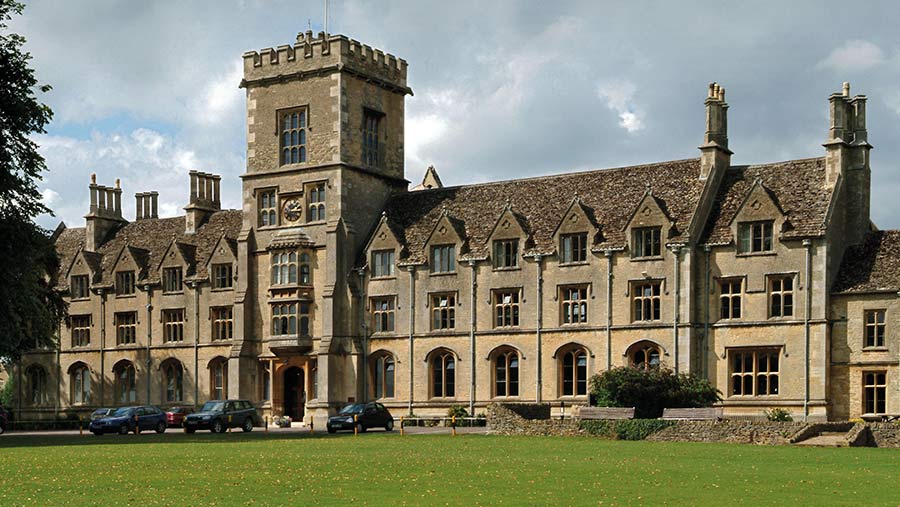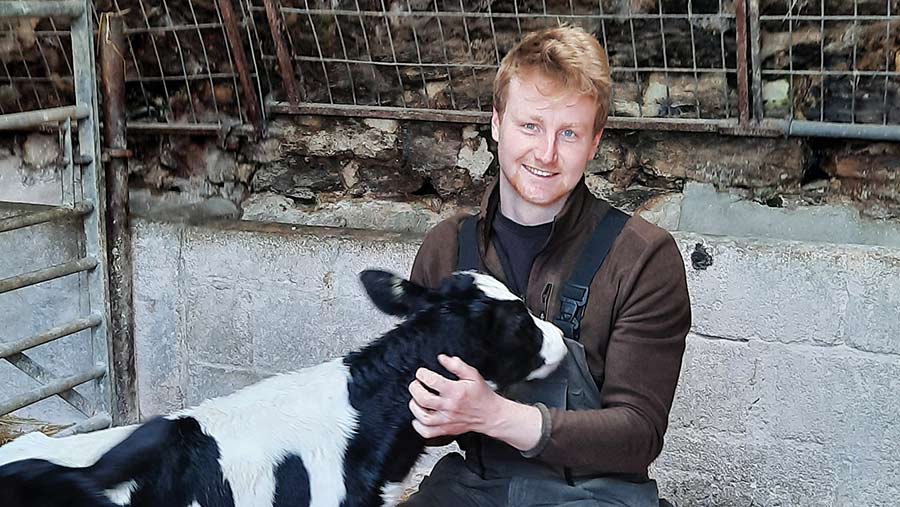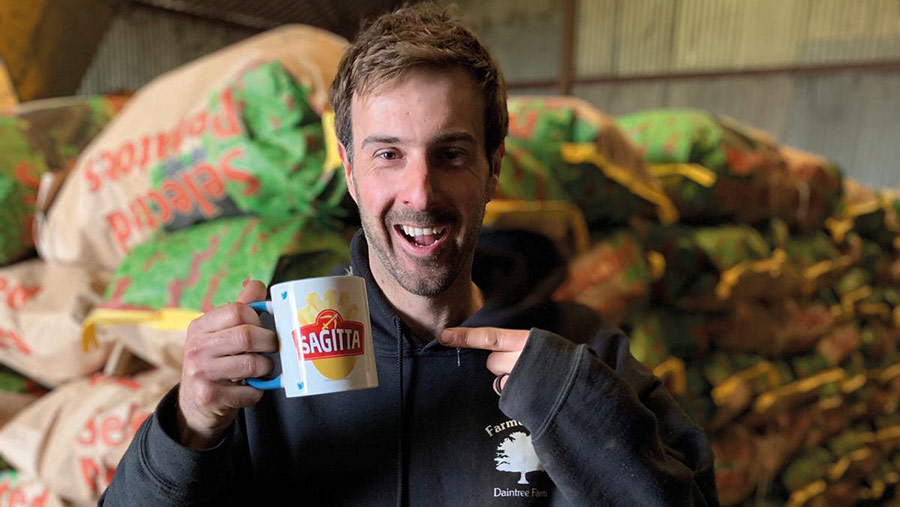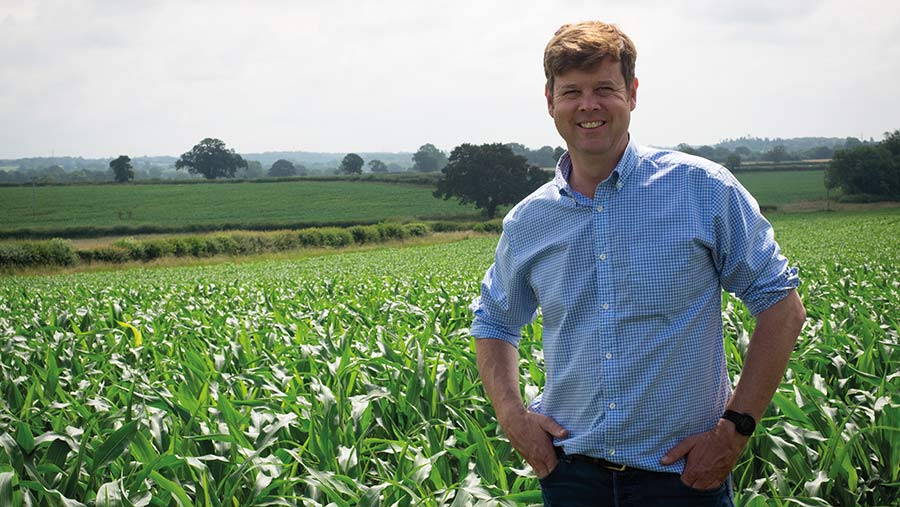Is an agricultural degree worth doing?
 RAU Cirencester © Christopher Jones/Alamy Stock Photo
RAU Cirencester © Christopher Jones/Alamy Stock Photo Over the past three years, figures from the Higher Education Statistics Agency have shown a gradual climb in the number of students enrolling to study land-based and agricultural degrees.
In the 2021-22 academic year alone, 15,640 UK students took up agricultural and food-based studies, showing a marked increase in numbers when compared with the 15,370 enrolments for 2020-21 and 13,985 in 2019-20.
Current A-level students will be aware that the Ucas application window is soon to open, but for many the decision of whether to go to university will still hang in the balance, with the same question left unanswered: is doing a degree worth it?
See also: How farmers are helping to educate school children about agriculture
New entrants
For those from non-rural backgrounds, an agricultural degree can be a gateway into the industry, and provides a vital opportunity to meet like-minded people with shared interests.
Josh Redford studied agriculture at the Royal Agricultural University (RAU) in Cirencester, and now works as the regional NFU representative for Hertfordshire.
Hailing from a non-farming background, his degree provided a solid foundation from which he has built his career within the sector, and it has allowed him to gain knowledge across a range of topics.
“I first became interested when I started volunteering on a dairy farm after school. They offered me a Sunday part-time job, and from that I decided I wanted to do a degree in agriculture,” says Mr Redford.
“I went into my degree thinking I wanted to work in the livestock sector but, as time went on, I specialised in crops and went on to take up a trainee job as an agronomist.
“It just sort of snowballed from there.”
As a new entrant into the industry, Mr Redford’s degree in agriculture has been a useful talking point in job interviews, and he has found that the qualification is considered valuable among employers.
“Many recruiters look for a degree; it’s like a tick-box. It demonstrates that you have those basic written and analytical skills that are all transferable,” he says.
“I was able to use my degree and examples of my uni work in the interview for my first job, and without that, I wouldn’t have moved over to the Fens.
“University is like a catalyst for trying new things, and without it I could have easily ended up somewhere else. I would say it has broadened my horizons.”
His studies also provided a vital opportunity to meet peers with similar interests, something he had not experienced during his time at school.
“It’s a classic line, but you really are able to make valuable friends and contacts at university, and surround yourself with people who have similar interests to you,” says Mr Redford.
“Before, that would have been pretty rare, coming from a big state school where you’re the only person who is interested in farming.”
Bringing value back home
Third-generation dairy farmer Joseph Sweet, from Ventonarren Farm, Cornwall, also studied agriculture at RAU. Growing up on the family-run dairy farm, he admits that pursuing a career in farming was not always the plan.
“When I was doing my A-Levels my dad had an accident on the farm. After seeing the worst side of the industry, I didn’t want anything to do with farming,” says Mr Sweet.
“The farm always drew me back, and I ended up doing a foundation degree at Cirencester.
“I wasn’t really sure what I wanted to get out of it at the time – I thought I’d go into it and get a job on the fringe of farming. But as it happened, I got more and more involved in the day-to-day running of the farm.”

Joe Sweet © Joe Sweet
While Mr Sweet already had plenty of hands-on experience from growing up on farm, he found the degree modules with a business focus particularly helpful, providing inspiration for new ways to add value to the farming business at home.
“The core of the degree was mainly business related, and the studying was always angled towards farm diversifications, and having another income stream to reinvest into the business,” says Mr Sweet.
“I had a rough idea of the ins and outs of what the farm was doing, but it definitely helps to know what you’re looking at in the end-of-year summary, and to actually know what the accountant is talking about.”
Having graduated and returned home to the family farm, he has since been able to put his knowledge of diversifications into practice, and has recently installed a milkshake vending machine.
Although Mr Sweet admits that, aside from the business elements of his course, he picked up most of his practical knowledge from working alongside his mum on the farm, rather than through his studies, he believes the degree was worthwhile due to the community he was able to form.
He says: “It’s definitely more about the people I met – being surrounded by likeminded people who are all in the same industry, but slightly differently inclined in where they want to go.
“When you surround yourself at university with farmers and people involved in the sector you realise it’s actually quite a cool industry to go into.”
Alternative routes
Farming on the Cambridgeshire fens just outside Peterborough, arable farmer Luke Abblitt took on his farm tenancy when he was just 21 years old, and having no degree was not considered when making his tenancy application.
It was an opportunity, he says, that he would have missed out on had he been studying.

Luke Abblitt © Luke Abblitt
“For me, having a degree wasn’t important,” explains Mr Abblitt. “I look at all of the jobs that I do on farm – I’ve got to grow crops, so that would lend itself to a degree in agriculture, but what about the other stuff? I had to mend a machine this morning, so do I need a degree in agricultural engineering too?
“I’m going to do some book-keeping later, so do I need a degree in accounting as well?”
Finding, like many farmers, that he has to wear many hats to run a successful business, for Mr Abblitt hands-on experience has been more valuable than a degree.
“It really depends on what you want to do,” he says. “I’m an on-the-ground, practical farmer, but if I were to hire a farm manager, for example, I would probably want to see something that proves they are capable – and a degree usually does that.
“You wouldn’t go and see a doctor who hasn’t completed a degree, and has just learned on the job.
“But, for me, I’ve got so many aspects to my job that merge into one, I don’t think a degree would help me to run the business.”
Despite opting out of a degree, Mr Abblitt studied for a national vocational qualification in agriculture, and highlights that there are a number of different routes for attaining more knowledge within the sector.
He says: “Look at how many webinars you can access these days, as well as short courses and even remote classes – there is a lot of free training out there where you can pick up a lot of what you need to know.”
Employers
While students often undertake a degree to improve their career and employment prospects, for many recruiters the value of a degree can be trumped by other factors, such as character and experience.
Robin Aird, manager at Charlton Park Estate in Malmesbury, Wiltshire, studied a degree in agriculture at Harper Adams University, and now regularly recruits within the agricultural sector.

Robin Aird © Kathy Horniblow
When looking for the ideal candidate, Mr Aird says: “From an employer’s point of view, I don’t worry about whether someone has a degree. I think common sense trumps everything.
“With farming, it’s all about experience, learning, and diversity of learning. I think that’s very important.
“There’s no one way to learn farming, and the more ways you can experience it, the better. It’s about hands-on experience.”